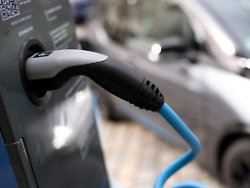At its auto summit, the federal government decided to extend the purchase premium for e-cars until 2025. The car lobby demands more charging stations for this. A separate committee is to discuss this before Christmas. The strategy of the automaker Tesla should also be questioned.
Following the Federal Government's resolutions for further purchase premiums for e-cars, the automotive industry is calling for the charging infrastructure to be expanded rapidly. For this purpose, representatives of the mineral oil industry, the energy industry, the housing industry, the municipalities and the automotive industry should be brought to one table before Christmas, said Hildegard Müller, President of the Association of the Automotive Industry (VDA).
So far everyone looks at the other. Some wanted more electric cars, others wanted more charging options first. "We only create trust when a comprehensive infrastructure is created," emphasized Müller. It must also be questioned whether it makes sense, following the example of Tesla, for every car manufacturer to set up its own charging network and only allow its electric cars to be charged. That would only make the whole thing more expensive and would also be a huge challenge for the network operator, said Müller, who used to work in the energy industry.
"My aim is to coordinate and accelerate procedures. And to involve the state with financial means." Currently, the expansion is hardly economically feasible. "If more e-cars are to come, the federal, state and local governments must now make advance payments and make the environment attractive." There are currently only 32,000 charging points in public spaces.
Government expects "ambitious contribution"
On Tuesday evening, the federal government, in the presence of Chancellor Angela Merkel, decided to extend the purchase premium for electric cars beyond 2021 to 2025. In addition, a scrapping bonus for older trucks and a fund to support companies in converting to climate-friendly drives were launched. The supplier industry, which was particularly ailing in the Corona crisis, can count on further help.
In addition, the federal government expects an "ambitious contribution" to the development of charging facilities. The aim is to equip at least 25 percent of all filling stations with fast charging facilities by the end of 2022. After that, the quota is to be increased gradually. To this end, talks with the mineral oil industry about a voluntary commitment should begin as soon as possible. If the agreed targets are not achieved voluntarily, the government wants to enforce the quotas by law.
The car manufacturer Volkswagen welcomed the support package for the industry as a "strong signal for customers as well as for the environment". It shows "the government's political will to support the rapid change in Germany's leading industry in the corona-related crisis," said a spokeswoman.
Criticism of the future fund: "declaration of bankruptcy"
Green parliamentary deputy Oliver Krischer criticized, however, particularly the future fund from tax money. "The fact that we need something like this in Germany for this industry shows what went wrong in the past," he said on Bayerischer Rundfunk, speaking of a "declaration of bankruptcy". The government and the automotive industry lacked a "consistent strategy" for a mobility transition, Krischer said.
Germany's top consumer advocate, Klaus Müller, welcomed the extension of the innovation bonus – but the traffic turnaround was "more than e-car funding," said the head of the Federal Consumer Association (vzbv) of the "Rheinische Post". With a "mobile bonus for everyone", those consumers "who want to switch to buses and trains or sharing" should finally be supported.
. (tagsToTranslate) Economy (t) Electromobility (t) Car manufacturer (t) Association of the automotive industry
